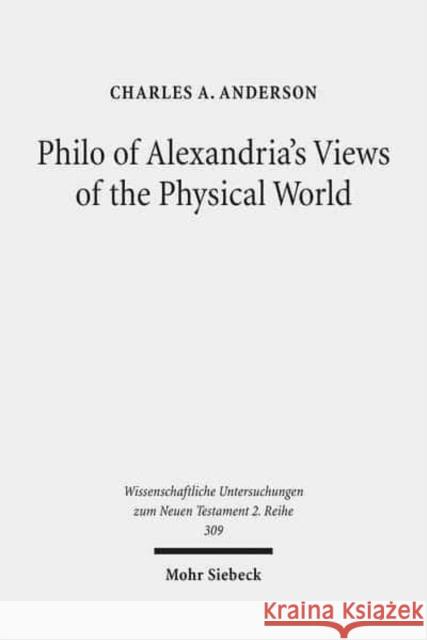Philo of Alexandria's Views of the Physical World » książka
Philo of Alexandria's Views of the Physical World
ISBN-13: 9783161506406 / Angielski / Miękka / 2011 / 299 str.
Philo of Alexandria fuses biblical interpretation and Greco-Roman cosmology in seemingly contradictory fashion: the physical world is sometimes God's enemy, but elsewhere his son and greatest work. Charles A. Anderson examines six key cosmological terms for Philo, including kosmos, physis (and natural law), and argues that his ambivalence is best understood perspectivally. The 'lower' perspective views the world positively, as a means of knowing and becoming like God, while the 'higher' perspective sees it negatively, as an obstacle to true communion with God. Philo is ultimately a cosmological pessimist and thus diverges surprisingly from the main lines of both Scripture and Platonism. This book will be of interest to students of ancient Judaism, ancient philosophy, biblical cosmology, and all who reflect on how Jewish-Christian sacred texts can influence contemporary environmental discourse.
Philo of Alexandria fuses biblical interpretation and Greco-Roman cosmology in seemingly contradictory fashion: the physical world is sometimes God's enemy, but elsewhere his son and greatest work. Charles A. Anderson examines six key cosmological terms for Philo, including kosmos, physis (and natural law), and argues that his ambivalence is best understood perspectivally. The lower' perspective views the world positively, as a means of knowing and becoming like God, while the higher' perspective sees it negatively, as an obstacle to true communion with God. Philo is ultimately a cosmological pessimist and thus diverges surprisingly from the main lines of both Scripture and Platonism. This book will be of interest to students of ancient Judaism, ancient philosophy, biblical cosmology, and all who reflect on how Jewish-Christian sacred texts can influence contemporary environmental discourse.











